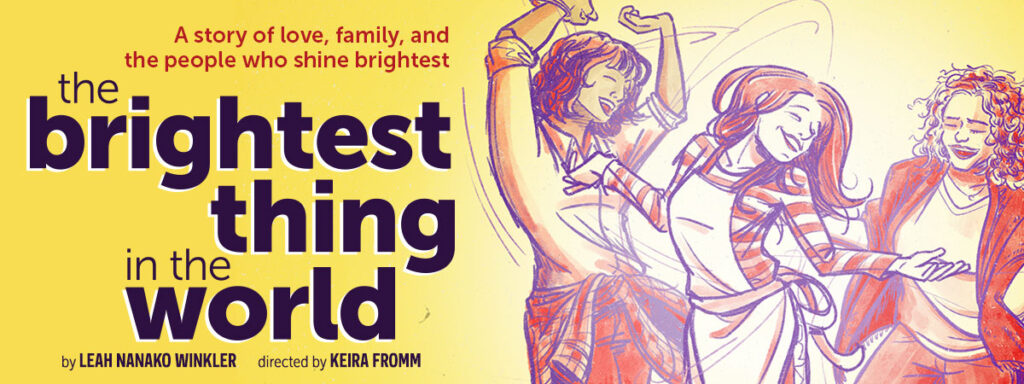
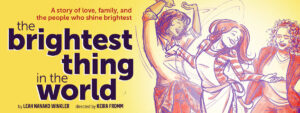 *** Set in Lexington, Kentucky, from 2016 to 2019, “The Brightest Thing in the World” by Leah Nanako Winkler is meant to shine a light on struggles with substance abuse via the charming character of Lane (Claire Kaplan), who works as a barista in a local bakery. In the course of the show, we see from Lane’s unique perspective why some people turn to illegal and highly addictive drugs: in her case to treat her constant physical pain. But when drugs and drug addiction became a central (and expensive) focus of her life, her habit became a tightly-guarded secret. This ultimately affected all those around her, especially those who loved her and cared about her. In this well-intentioned play, the audience comes to understand how difficult it is for any individual (regardless of age, education, or background) to stay sober over any length of time. Staying clean is an everyday struggle, and the possibility of relapse is constant.
*** Set in Lexington, Kentucky, from 2016 to 2019, “The Brightest Thing in the World” by Leah Nanako Winkler is meant to shine a light on struggles with substance abuse via the charming character of Lane (Claire Kaplan), who works as a barista in a local bakery. In the course of the show, we see from Lane’s unique perspective why some people turn to illegal and highly addictive drugs: in her case to treat her constant physical pain. But when drugs and drug addiction became a central (and expensive) focus of her life, her habit became a tightly-guarded secret. This ultimately affected all those around her, especially those who loved her and cared about her. In this well-intentioned play, the audience comes to understand how difficult it is for any individual (regardless of age, education, or background) to stay sober over any length of time. Staying clean is an everyday struggle, and the possibility of relapse is constant.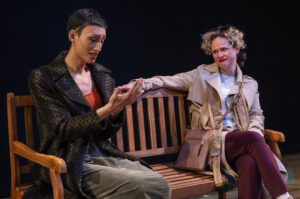
The beginning is very cute and clever with lots of witty dialogue. One day, while Lane is behind the counter, a “queer” female named Steph (Jojo Brown) comes in to drink coffee with almond milk and work on her laptop computer. From that day forward, Steph shows up every morning and orders the same thing. Trying to be gluten free and dairy free in the hopes of “feeling better”, she thus avoids eating any of the sweet treats. Lane, doing a wonderfully devilish voice, entices Steph to cheat on her diet and eventually order some pastry that she really wants to enjoy. In due course, the friendly and casual interaction between the two women turns into a romantic relationship, and Lane admits to her sister Della (Cyd Blakewell) just how much she is in love with this new person in her life.
Then in a pretend conversation with Steph, Lane confesses to the audience that she was once addicted to heroin. She had a tremendous amount of pain in her body, and all of the doctors and alternative medical and health practitioners could not seem to help her. After going everywhere throughout the globe and spending thousands of dollars on treatments that didn’t work, she found that heroin made her escape the pain if only for a few moments. Finally, she could live her life… until the drug took it over. That said, she was very proud to be four years sober when she met Steph. “Should I tell her about my past?” she asks her sister. This is one of the most heartfelt scenes in the show.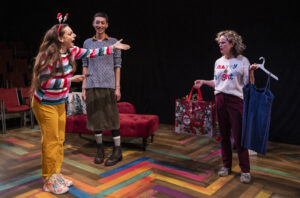
Steph seems to have a sixth sense about Lane; she knows something isn’t right with her romantic partner but can’t exactly figure it out. Steph has her own problems. She has a child named Bee, who lives with her grandparents (Steph’s parents), in part because Steph is not considered a fit mother. Steph admits to Lane that this reality makes her free to live and to love and not have any worries about family obligations. But she simultaneously feels guilty that she’s not around for her daughter and wants to make it up to her.
The performance is filled with lots of comedic lines throughout, especially when Steph and Lane first get to know each other. But once their relationship becomes more established, the comedy starts to distract from the main plot having to do with illicit drugs, and there is too much extraneous dialogue. While some of this banter is meant to have shock value and be funny at the same time, it draws you away from the intensity of the story—and it unnecessarily stretches out time. Five or ten minutes could easily be cut from the 100-minute show. Yet there are moments when that time stretch is important, such as during the close-knit interactions that take place separately between Lane and Steph and between Della and Steph. It’s mainly when the three characters are together in one room that the dialogue feels forced and the drama becomes uneven. There are also spots that are somewhat overacted, occasionally to the point of seeming unrealistic.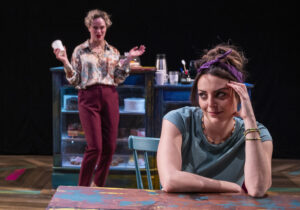
I don’t believe I’m ruining anything for you when I say that the story has a number of predictable elements within it. But now a spoiler alert: How did Steph figure out Lane’s hidden life? Why would Steph demand Lane’s phone from her sister but have absolutely no interest in Lane’s diary, which Della states is full of pages about her love for Steph? (I would have thought Steph would have wanted both!) Was Steph trying to figure out what Lane was telling other people about their relationship or to find out still more secrets that Lane was holding back—possibly including the name of the person who was selling her the heroin? Why was Steph being so unreasonable about wanting to have the phone? What was so wrong with Della keeping it? Were they both trying to hide something? This part left me baffled—about everything!
Audience seating is on two sides of the room across from each other, with the stage in the middle (like a bowling alley). This set by scenic designer Sotirios Livaditis works well, especially during those moments when a character has to leave the stage to go to the bathroom (in the story, of course). Properties designer Amanda Herrmann has pleasantly created the illusion of a living room and has placed just enough props on stage to resemble a bakery setting. Lighting by Conchita Avitia is good for this plot; I especially liked the globular lights on the ceiling that are often meant to represent stars; it is interesting how the lighting changes when the characters are alone versus together as a group. However, all the strobe lighting at the end didn’t do anything for me. Christopher Kriz’s sound design, sound effects, and composition are great and particularly effective in portraying successive days and months and movement through time and space. Costumes by Gregory Graham are fitting for the time period; I especially like the striped sweater that Lane wears. While I’m not sure that dance is necessary to the plot, it is nicely choreographed by Jenn Freeman. I especially like the work of intimacy and violence designer Sheryl Williams in making the close contact scenes look authentic. A good portion of the story is set around Christmas, so it would have been better had the production played in December rather than early spring, although the cold and snowy weather on opening night made it feel like a winter day.
The idea behind this play is that addiction can happen to anyone, and it is important to understand the suffering of those who are drug-dependent (including their families), especially in an era when opioid use is rampant. The story emphasizes the importance of Narcan (i.e., Naloxone) in counteracting a drug’s harmful effects, and containers of it are distributed to audience members at the end of the performance (that is, if you care to take one). Towards the end, we realize the sorts of things that Lane might do for a heroin fix and how this reality would wind its way into her daily activities. There is a lot more going on in this drama than what we actually see on stage. But that’s okay. The fact that such a heavy story could be made so entertaining is both a credit to playwright Winkler and director Keira Fromm.
Basically, the presentation illustrates how physical and behavioral addiction can cause a person to lose everything in their lives including their self-respect. Can they ever truly fight off the demons? These may be familiar from one person to the next, even though the path which each addict takes is not necessarily the same. Lane had loved ones who were supportive of her and her recovery in the midst of all of her struggles. But trying to overcome substance abuse is a brutal (if not nearly impossible) task especially if you don’t open up to others that you have a problem.* This is an emotional show, and I should have been moved even more than I was.
About Face Theatre’s production of “The Brightest Thing in the World” runs through April 13, 2024, at The Den Theatre, 1331 N. Milwaukee Avenue, in Chicago’s Wicker Park neighborhood.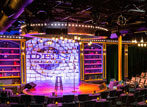
General admission tickets are $35.
“If you’re able to support us at that level, we greatly appreciate it. If a $25, $15, or $5 ticket is right for you, please take advantage of that price…. There are limited quantities available at each level.”
For more information and to purchase tickets, see: https://thedentheatre.com/performances/2024/3/14/the-brightest-thing-in-the-world-about-face-theatre-the-den-theatre or call (773) 697-3830.
*“This performance explores the disease of addiction and depicts substance abuse. If you need help, don’t use. Call the SAMHSA National Helpline at 1-800-662-4357 or text your ZIP Code to 435748. For more information, email dionne@aboutfacetheatre.com.”
To see what others are saying, visit www.theatreinchicago.com, go t Review Round-Up and click at “The Brightest Thing in The World”.


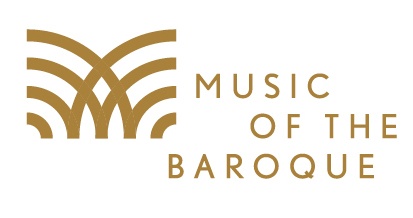


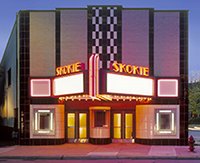
More Stories
“Dummy in Diaspora”
“The Magic School Bus: Lost in the Solar System”
“February House” reviewed by Julia W. Rath